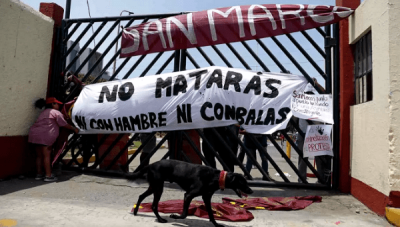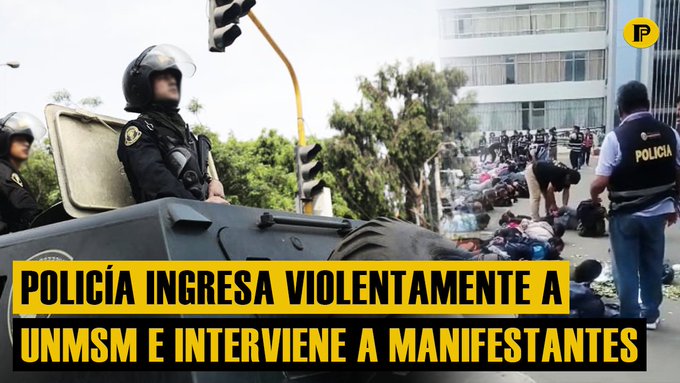Thousands in the Peruvian Capital Demand the Resignation of the Military-backed Regime
Copper mine attacked while tourist areas closed amid national uprising against western-backed regime in South America

All Global Research articles can be read in 51 languages by activating the Translate Website button below the author’s name.
To receive Global Research’s Daily Newsletter (selected articles), click here.
Follow us on Instagram and Twitter and subscribe to our Telegram Channel. Feel free to repost and share widely Global Research articles.
***
As the political situation becomes even more intense in the capital city of Lima in Peru and other regions of the South American country, the western-backed administration of Dina Boluarte has called for dialogue among the contending political forces.
Nonetheless, despite the Boluarte’s stance in running as vice-president with detained ousted President Pedro Castillo during 2021 on the left-wing ticket of the now fractured Peru Libre Party, the current right-wing and military-installed leader soon allied with the armed forces in attempts to consolidate a regime which was immediately recognized by the White House and the United States State Department.
In continuing the legacy of supporting military coups against progressive and socialist-oriented movements throughout Latin America, President Joe Biden has not been pressured by his political party as to why he has backed a coup against an elected leader. Castillo, a former school teacher and trade union leader, has won the allegiance of the people located largely in the rural areas of the South of the mineral-rich state.
On December 7, then President Castillo called for the dissolution of the Congress so that elections could be held in Peru. This proposal was rejected by the majority of the legislature who in turn voted to remove the president from office. As Castillo was leaving the area where some claimed he was to take refuge in the Mexican embassy, he was arrested by the security forces and detained where he remains until this day despite calls from numerous regional governments demanding his release, echoing the mass sentiment within Peru among the farmers and workers.
Over 50 people have reportedly been killed as a direct result of the uprising against the ouster and detention of Castillo. A state of emergency has been declared in six district regions of the vast country as Boluarte and the military has pledged to end the demonstrations through brute force.
During the week of January 16, thousands of people took to the streets in the capital of Lima where workers and farmers demanded the resignation of Boluarte, the release of Castillo and the immediate holding of national elections. Although Boluarte has repeatedly reimposed states of emergency, the demonstrations are growing in their participation and militancy.
In a Reuters press agency report from January 20 says that:
“Dozens of Peruvians were injured after tensions flared again on Friday (Jan. 20) night as police clashed with protesters in anti-government demonstrations that are spreading across the country. In the capital Lima, police officers used tear gas to repel demonstrators throwing glass bottles and stones, as fires burned in the streets, local TV footage showed. In the country’s southern Puno region, some 1,500 protesters attacked a police station in the town of Ilave, Interior Minister Vicente Romero said in a statement to news media. A police station in Zepita, Puno, was also on fire, Romero said. Health authorities in Ilave reported eight patients hospitalized with injuries, including broken arms and legs, eye contusions and punctured abdomens. By late afternoon, 58 people had been injured nationwide in demonstrations, according to a report from Peru’s ombudsman. The unrest followed a day of turmoil on Thursday (Jan. 19), when one of Lima’s most historic buildings burned to the ground, as President Dina Boluarte vowed to get tougher on ‘vandals.’”
In the south of the country where Castillo is greatly admired among the Indigenous and rural population, since the December 7 impeachment in the Congress, people have blocked highways and airports to demonstrate their commitment to removing the present government. The historic tourist attraction of Machu Picchu, the 15th century citadel of the ancient Inca civilization, was closed to the public on January 20 due to the escalating anti-government unrest.
Prior to the pandemic, approximately one million people would visit Machu Picchu making it a major source of revenue for the country. The site illustrates the advanced social character of South American Indigenous civilizations prior to the arrival of the European colonialists and enslavers who viciously oppressed and exploited the people.
According to another Reuters article on the situation in the south of Peru it emphasized:
“In the Cusco region, the gateway to Machu Picchu, Glencore’s (GLEN.L) major Antapaccay copper mine suspended operations on Friday (Jan. 20) after protesters attacked the premises – one of the largest in the country – for the third time this month. Airports in Arequipa, Cusco and the southern city of Juliaca were also attacked by demonstrators, delivering a fresh blow to Peru’s tourism industry. Cultural authorities in Cusco said in a statement that ‘in view of the current social situation in which our region and the country are immersed, the closure of the Inca trail network and Machu Picchu has been ordered, as of January 21 and until further notice’.”
Significance of the Demonstrations in Lima
Thousands of farmers, workers and youth from various regions of the country have poured into the capital of Peru where many have been housed by students and intellectuals at the San Marcos University. On January 21, the Peruvian National Police entered the university campus where they attacked anti-government protesters.
Untold numbers of people have been arrested while funds and other resources collected to sustain the demonstrators were seized by the security forces. Students took over the University on January 17 in solidarity with the masses of people protesting the coup regime of Boluarte.
These developments portend much for the future outcome of the struggle against the present regime and its international backers among the imperialist states and their allies in the Latin America region. The south of Peru is a center for tourism and mining while the seat of government is based in the capital of Lima.
Both the economic lifelines of the country and the center of the national government are critical in the ongoing suppression of the popular will of the majority of the people within the country. The organizations opposing the Boluarte administration are advancing the notion of a constituent assembly to serve as an interim government until national elections can be organized. Such a scenario would provide a mechanism to foster genuine democratic discussions and debates over the type of dispensation that would benefit the people of Peru.
International solidarity with the people of Peru against the coup regime have been exemplified by the following statements from governments, trade unions and mass organizations around the world published by Telesur:
“CUBA: The revolutionaries of Latin America and the rest of the world have the moral obligation to show solidarity with the Peruvian people and contribute to making visible the struggle that is being lived today in the land of Mariategui and Tupac Amaru,’ said the Red Scarves (Pañuelos Rojos).
CHILE: Paulina Cartagena, the vice president of the National Directorate of Teachers, posted on social networks images in which school teachers are seen holding signs that read, ‘The Peruvian people will not surrender.’
MEXICO: ‘The coup right wing trembles. Today the people of Peru are preparing to take back the reins of their destiny. From all corners of that sister country, thousands of women and men will try to take Lima peacefully,’ Morena Party founder Tomas Pliego.
ARGENTINA: ‘All the strength for the Peruvian people in their just fight for dignity. Total repudiation of the repressive government. Soon we will be accompanying them in a new mission of solidarity and human rights,’ Professor Juan Grabois announced.
SPAIN: ‘At Sant Jaume in Barcelona Square, we accompany our Peruvian sisters in their protest against the repression and in memory of all the injured and murdered people, stated the Catalan organization Entrepueblos Entrepobles Entrepobos Herriarte.”
These expressions of outrage against the violent repression of the Peruvian people by an obviously U.S.-supported coup are essential in building an anti-imperialist movement aimed at upholding the democratic aspirations and right to self-determination for the majority of the people. The genuine revolutionary forces throughout South America, Central America and the world acknowledge the legitimate struggles of the Peruvian people while recognizing the important role these developments are playing in the much broader transformation of the international situation.
*
Note to readers: Please click the share buttons above or below. Follow us on Instagram and Twitter and subscribe to our Telegram Channel. Feel free to repost and share widely Global Research articles.
Abayomi Azikiwe is the editor of the Pan-African News Wire. He is a regular contributor to Global Research.
All images in this article are from the author / featured image: Peru San Marcos University attacked by the PNP on Jan. 21, 2023


